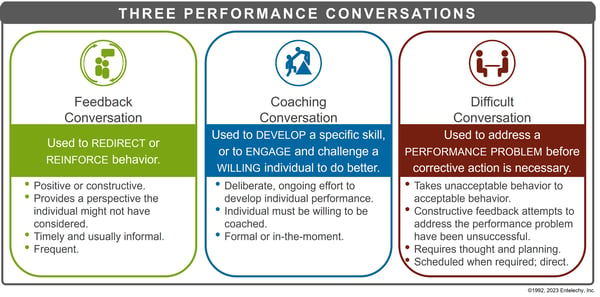Being a strong leader isn't just about managing your direct reports effectively. You also must be an engaged and motivated follower. Everyone has a boss — even CEOs — and it's in your best interest to learn how to best work with him/her. One of the biggest challenges we hear about from the great leaders we meet during our training programs is how to best manage upwards.
Managing up is a critical skill to have in your leadership toolkit, even if you have an effective boss. And, it's even more critical if you work with a leader who is relatively inexperienced, ineffective, or difficult to work with. There's certainly no shortage of information available on the topic of managing up. The Wall Street Journal, Forbes, and Harvard Business Review have all addressed managing up and those articles are worth reading when you have some extra time.
If you're short on time, here are some common themes:
- Take time to get to know your boss. What's their preferred communication style/method? When are they largely distraction-free and open to conversations? Is it important to them to build personal relationships or do they prefer to get down to business? What motivates them at work? What broader organizational goals are they responsible for achieving?
- Establish rules of the road. Take the previous tip one step further and discuss these items with your boss directly to reach agreement on how you two will communicate.
- Offer solutions to problems. When seeking guidance or direction, be sure to present a few thoughtful suggestions on how to proceed. Strive to be a problem solver.
- Be respectful and patient. Try to put yourself in your boss's shoes to understand their behavior. Don't lose your temper in the heat of the moment. Don't badmouth your boss behind his/her back. Understand that they are facing pressures you aren't privy to.
- Address issues directly and confidently. Schedule time to meet privately and discuss any persistent problems or concerns.
That last one is certainly the hardest to master and one we feel is worth unpacking further. In our Unleash Your Leadership Potential program, we educate participants on the Three Performance Conversations:

While we typically frame these conversations from the leader's perspective in managing their subordinates, it's sometimes appropriate to conduct a Feedback Conversation or a Difficult Conversation with your boss. For example, your boss may be inappropriately conducting skip-level meetings with your employees or she may be bouncing from priority to priority, making it difficult for you to focus your employees. Just ensure that you have:
- Developed the trust needed to be viewed as a confidante.
- Aligned yourself with your boss’s goals/objectives (and can articulate them).
- Demonstrated (or can demonstrate) the expertise that shows you know what you’re talking about.
- Prepared for the conversation by:
- Clarifying the purpose of the meeting.
- Specifying the issue; be clear and objective on the behaviors you're seeing from your boss.
- Calling attention to the impact of those behaviors on the group, on you, on the boss, on customers, etc. In both Feedback and Difficult Conversations, emphasizing the impact of the behavior can be the “a-ha moment” that your boss needs in order to change his or her behavior.
- Offering to work together on an effective solution AND being prepared with a solution or two for consideration and approval.
- Offering to move forward on a trial basis; “if this doesn’t show results in the next 30 days, let’s revisit…”
If you'd like to delve deeper into the Three Performance Conversations, click the link below to learn more and view the models:
At the end of the day, it's important to remember that to be a good leader you need to be a proactive and passionate team member as well. Sometimes that requires that you manage upwards. We hope our Three Performance Conversations model gives you the tools you need to successfully manage onward and upwards. As always, please reach out to me directly if I can answer any questions or provide additional information about how we can bring Entelechy's Three Performance Conversations to your leaders.

